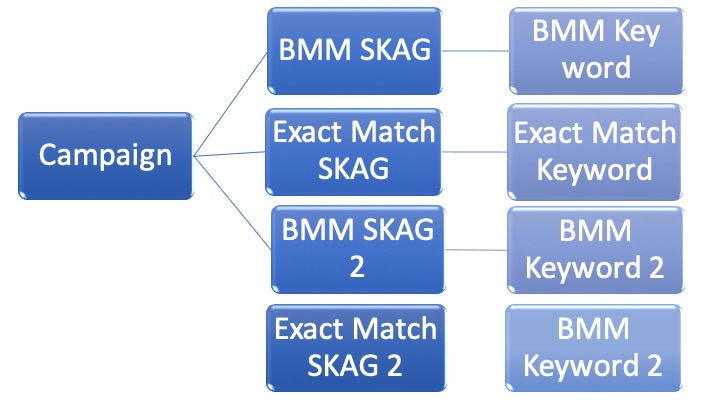You might be reading this title and think: what on earth is a SKAG? It sounds like a name you would call someone who is obnoxiously irritating – SKAG is actually an acronym for a Single Keyword Ad Group. A highly debated topic in the world of PPC, SKAGs are quite like Marmite – you’ll either love them, or you won’t!

SKAGS are ad groups with one keyword in them instead of having multiple keywords, which is useful if you want to gain more control over certain areas of your account, especially if you are advertising for a company with a broad array of generic products (think retail & jewellery).
If you execute the process of SKAG creation properly, you might be on track to seeing great improvements – a good way of increasing CTR is by having super relevant ads containing highly specific keywords, and SKAG creation essentially involves this. A higher CTR means higher quality scores and return on ad spend (or ROAS)!
However, make sure you have a good understanding of the business you’re advertising for: if whatever you are advertising is niche, search volume could be too low to justify using SKAGs.
Let’s examine this.
How To Create SKAGs In Google Ads

You might be thinking: well, won’t having just one keyword reduce search volume and make my ads underperform?
Not necessarily – you’re allowed to have more than one match type for a SKAG.
There are two ways to execute match type distribution, depending on the size of your account (i.e. do you have 20 keywords or 2,000 keywords in total?). We’ll be using broad match modified (BMM) and exact match types in these examples.
If you have a smaller number of keywords, then it makes sense to have a SKAG per match type, I recommend Plan 1:

IMPORTANT: If you implement Plan 1, make sure you negative all exact match keywords from the BMM SKAGs – you don’t want to bid against yourself!
Say you’re advertising for a pharmaceutical company with supplements geared towards toddlers only. This account has no more than 40-50 keywords max, so therefore it makes sense to implement Plan 1 when creating SKAGs.
However, if your keywords exceed a certain amount, it can be an option to have more than one match type within the SKAG, aka Plan 2:

Later on, when you look at data, with either approach you then have metrics to compare side by side – i.e., which out of the Exact Match and BMM keywords have higher engagement and a greater conversion rate.
You can then optimise your account accordingly, and perhaps may choose just to run one SKAG match type as a result.
Why haven’t I suggested using phrase match? That’s a good question—without a specific reason for having the need to use phrase match, BMM and exact match usually make more sense. This reason may include specific landing page for a particular phrase.
BMM will pick up anything phrase match does, and in any order within a search query, so they make more sense to test SKAGs with.
Pros & Cons

Like virtually everything on planet Earth – SKAGs come with their pros and cons.
SKAG creation is ultimately down to two things in particular, which are: how much time do you have to test ad groups and keywords in an account? And how niche is your target market/product or concept you are advertising?
PROS:
- Improved Quality Scores – if you tailor your expanded text ads to include copy with your single keyword, Google will connect the relevancy and your average positions and search impression shares may start improving (thus increasing QS!)
- More Control – the granularity of your SKAGs allows you to reign more control over your account instead of Google
- Potentially Low CPCs – if your SKAGs result in a high Quality Score, you’ll be rewarded with discounted CPCs
- Easier Comparative Testing – SKAGs that contain both BMM and exact match keywords allow for easier access to comparative metrics, therefore allowing you to make optimisation decisions based upon which match type is most successful
- Potential Increase In Profit – If your SKAGs result in higher CTRs and low CPC’s, this means there is potential for a high ROAS (return on ad spend) therefore increasing your overall profit
CONS:
- Time-Consuming – creating SKAGs for larger accounts, especially if there are multiple keywords, takes a lot of time to implement and execute correctly
- Constant Negatives – you must keep adding ad-group level negatives to your SKAGs to ensure the BMM keywords do not dominate with most of the impressions
- Testing Is Long – if you implement a sizeable amount of SKAGs, testing will take much longer than usual due to data coming in at a slower rate
- Not Ideal For New Accounts – SKAGs only really make sense to implement if you already have historical data at hand to compare with
- Account Structure Can Get Messy – having too many SKAGs is a problem, it can be a lot to constantly monitor steadily growing additions of ad groups and keywords
Final Verdict

SKAG creation ultimately comes down to one thing: common sense.
If you have an ad account which has been optimised to the teeth for a year without significant change in performance– go for it!
However, if you are a new kid on the block (I swear there was a band about 100 years ago with this name), I would structure my account the traditional way, and only approach SKAG creation after enough historical data has been accumulated to merit this decision.
SKAGs can be your BFF if you know your business and have a decent amount of time on your hands:




